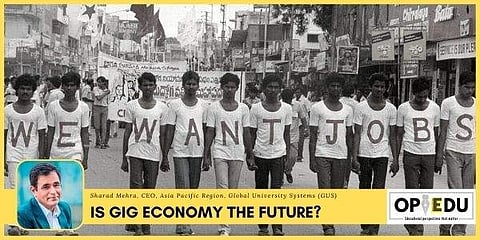

Today’s world is moving towards fluid careers hinged upon short-term contracts and great salaries. In an era of pink slips and uncertainty, modern India is in throes of a new trend wherein gig jobs and workers are redefining organisations and roles. The world is suddenly looking at these agile, flexible, adaptive, risk-takers who can easily slip into multiple roles, display multi-disciplinary talent and skills and also impact the economy positively. In this scenario, what is the future of jobs, how can organisations ensure and retain the right talent acquisition, what is an ideal gig recruit, how to fit inflexible schedules, work-from-home scenarios?
According to a new Ceridian report, more than half of the senior executives surveyed said that they want to expand their workforce over the next year and 35 per cent said that they will hire freelancers or contractors to do so. Ease of planning and flexibility are the two key catalysts to boosting this trend. In fact, the latest BCG Report Unlocking the Potential of Gig Economy in India points that 2.4 crore new jobs could be created in the blue-collar space and, by 2028, it could reach 9 crore jobs. These include mid-career and senior professionals who are skilled and adept at their roles. Clearly, it’s a reality that is here to stay.
READ ALSO : What it takes to get a job at Google: Lessons from a 22-year-old woman who recently joined the tech giant
Today, for instance, designers are being wooed by tech companies to enhance their customers’ user experience. Similarly, new-age professionals like data scientists are taking over fashion, media, design and other industry spaces instead of just traditional tech domains. Two decades ago, this idea would have raised eyebrows, but not anymore. The new gig workforce has skills and talents that are common to multiple functions and roles and can easily morph into any space, as per requirement. Therefore, siloed careers in defined spaces are slowly expanding to be more fluid and dynamic.
And so are roles, as organisations are realising the value productivity and impact of the fluid workforce in gig roles as compared to the conventional workforce. Some advantages include lower rentals, engaging professionals for short-term services and saving costs of insurance, travel and other expenses and also long-term costs of creating a full-blown role. For fluid workers, it’s a win-win as they can handpick their employers, work on multiple projects, catalyse collaboration and gain many skills.
These dynamic changes also mean that perspectives and the current workforce may need a huge re-jig for upskilling and talent deployment. Reports indicate that 90 million jobs add up to 1.25% to India’s GDP and create millions of new jobs across all sectors of India’s economy and those at the top will shift toward gig work.
These developments have also raised challenges for organisations and their HR departments, which are increasingly realising that the post-pandemic world is faster, demands greater dedication, efficiency but most importantly a nuanced impact. So how do they hire and hold on to this new breed of employees with fluid roles? By harnessing their potential and looking for potential hires who have multidisciplinary talent.
The gig workers of today may return tomorrow as full-time employees or in a senior advisory role. Therefore, organisations must make efforts to keep these fluid workers more engaged by extending support on well-being, acknowledging their contribution, providing a collaborative environment and technology to support their role besides encouraging them to feel a part of the team. This also includes setting up agile spaces inside the workplace wherein they can function whenever required to be in office space for a gig. These changes will only augment business goals.
And let’s not forget the conventional workforce amid these changes. They have their value too. Therefore, as a solid off-shoot of the gig ecosystem, it's crucial for organisations to focus on upskilling and reconsidering talent deployment. Fluid gig roles are here to stay. In my opinion, it’s a welcome change and a challenge for all of us to create a future that is equitable, accessible and most importantly, re-imagining employment.
Sharad Mehra, CEO, Asia Pacific Region, Global University Systems (GUS)
